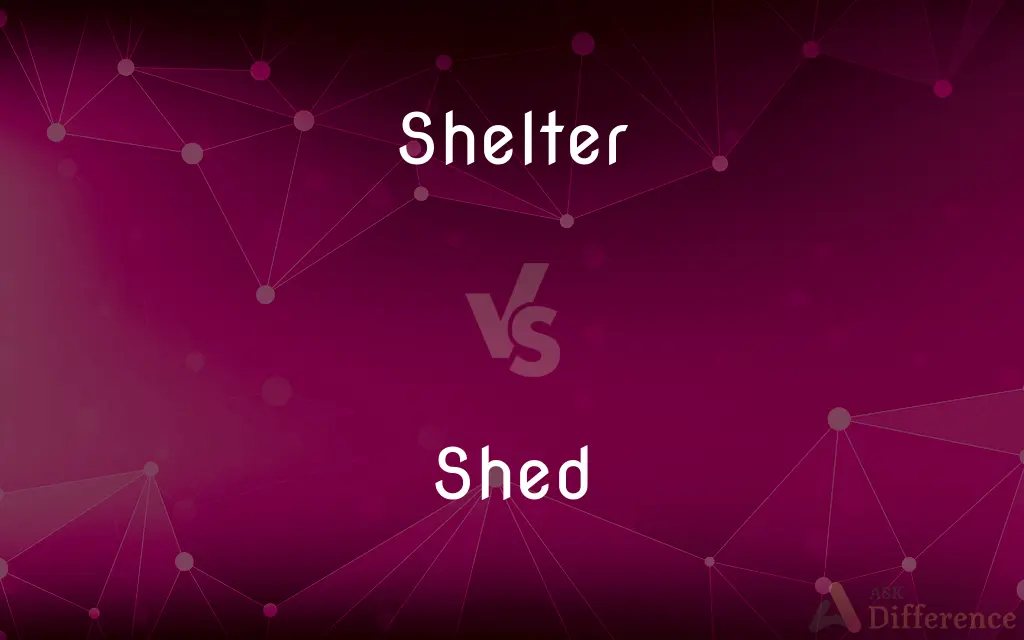Shelter vs. Shed — What's the Difference?
By Tayyaba Rehman & Fiza Rafique — Updated on March 27, 2024
A shelter is a structure providing protection from danger or the elements, often used for humans or animals, while a shed is a simple, single-story structure in a back garden or on an allotment used for storage, hobbies, or as a workshop.

Difference Between Shelter and Shed
Table of Contents
ADVERTISEMENT
Key Differences
Shelters are structures designed to provide safety and protection from adverse conditions, such as weather, predators, or dangerous situations. They can range from temporary setups like tents or emergency shelters to more permanent buildings like houses or bunkers. Shelters serve a primary purpose of offering security and comfort, emphasizing the well-being of its occupants. On the other hand, sheds are typically small, roofed structures, primarily used for storing garden tools, equipment, and sometimes serving as workshops or hobby areas. Sheds are utilitarian in nature, focusing on practical storage solutions rather than habitation.
While shelters are often built with the intention of protecting living beings, ensuring a level of habitability and comfort, sheds are designed with storage and activity space in mind, without the necessities for prolonged human occupancy. Shelters are versatile and can be found in various forms, from natural shelters like caves to man-made structures like buildings and tents. Sheds, however, are more uniform in their purpose, often found in residential or agricultural settings and used to support the main dwelling or business operations by providing extra space.
The construction and design of shelters take into consideration factors like insulation, ventilation, and space for sleeping or living, reflecting their role in providing a safe and comfortable environment. Sheds, while also built to withstand the elements, prioritize easy access to stored items, organization, and sometimes light workspaces, without the complex requirements needed for continuous living.
Shelters play a critical role in emergency and disaster situations, providing immediate refuge and safety for affected individuals. In contrast, sheds may serve secondary roles during such times, such as storing emergency supplies or tools but are not primarily intended for safeguarding human life.
Both shelters and sheds are essential in their respective capacities, addressing different needs. Shelters focus on safety, comfort, and habitation, reflecting the importance of protection and well-being. Sheds, while more modest in their function, are invaluable for their utility, offering organized space for storage and activities separate from the main living area.
ADVERTISEMENT
Comparison Chart
Purpose
To provide protection and safety for occupants.
For storage, hobbies, or workshops.
Occupancy
Designed for humans or animals to live or take refuge.
Primarily for goods, tools, or occasional work.
Design
Emphasizes comfort, insulation, and ventilation.
Focuses on storage efficiency and access to items.
Construction
Varies widely from simple to complex structures.
Generally simple, single-story buildings.
Location
Can be found in various settings, including urban, rural, and natural environments.
Typically located in gardens, backyards, or allotments.
Role in Emergencies
Primary refuge for safety and protection.
Secondary role, mainly for storage of supplies.
Compare with Definitions
Shelter
A structure providing protection from danger or elements.
The mountain climbers sought shelter from the storm in a cave.
Shed
Small building for hobbies or crafts.
She converted her shed into a pottery studio.
Shelter
Any form of covered protection.
Emergency shelters provide refuge for the homeless during winter.
Shed
A simple roofed structure used for storage or workshops.
He stored his gardening tools in the backyard shed.
Shelter
Protective space for animals.
The animal shelter cares for abandoned pets.
Shed
Structure for storing outdoor equipment.
The lawnmower and bicycles were kept in the shed.
Shelter
A place of safety in emergencies.
Community shelters open during natural disasters.
Shed
A workspace separate from the main house.
His woodworking shed was his private retreat.
Shelter
Temporary accommodation for those in need.
The disaster relief effort included setting up temporary shelters.
Shed
A place for storing garden supplies.
They organized the garden shed to prepare for spring planting.
Shelter
Something, especially a structure, that provides cover or protection, as from the weather
A shelter for hikers.
Shed
A shed is typically a simple, single-story roofed structure in a back garden or on an allotment that is used for storage, hobbies, or as a workshop. Sheds vary considerably in their size and complexity of construction, from simple open-sided ones designed to cover bicycles or garden items to large wood-framed structures with shingled roofs, windows, and electrical outlets.
Shelter
An institution providing temporary housing and sometimes counseling, as for the homeless, runaways, or victims of domestic violence.
Shed
A simple roofed structure used for garden storage, to shelter animals, or as a workshop
A bicycle shed
A garden shed
Shelter
An establishment that cares for unwanted or stray animals and tries to find owners for them.
Shed
Park (a vehicle) in a depot
The buses were temporarily shedded in that depot
Shelter
The state of being covered or protected
The fox found shelter in a cave.
Shed
(of a tree or other plant) allow (leaves or fruit) to fall to the ground
Both varieties shed leaves in winter
Shelter
To provide cover or protection for
Trees that sheltered the cows.
Agents who sheltered the spies.
Shed
Discard (something undesirable, superfluous, or outdated)
Many firms use relocation as an opportunity to shed jobs
Shelter
To invest (income) to protect it from taxation.
Shed
Cast or give off (light)
The full moon shed a watery light on the scene
Shelter
To take cover; find refuge
We sheltered under the store's awning during the storm.
Shed
Accidentally allow (something) to fall off or spill
A lorry shed its load of steel bars
Shelter
A refuge, haven or other cover or protection from something.
Shed
Eliminate part of (an electrical power load) by disconnecting circuits.
Shelter
An institution that provides temporary housing for homeless people, battered women, etc.
Shed
To have (a growth or covering) be disconnected or fall off by a natural process
A tree shedding its leaves.
A snake shedding its skin.
A dog shedding its hair.
Shelter
(transitive) To provide cover from damage or harassment; to shield; to protect.
Shed
To rid oneself of (something not wanted or needed)
I shed 25 pounds as a result of my new diet.
Shelter
(intransitive) To take cover.
During the rainstorm, we sheltered under a tree.
Shed
To take off (an article of clothing).
Shelter
That which covers or defends from injury or annoyance; a protection; a screen.
The sick and weak the healing plant shall aid,From storms a shelter, and from heat a shade.
Shed
To produce and release (a tear or tears).
Shelter
One who protects; a guardian; a defender.
Thou [God] hast been a shelter for me.
Shed
(Archaic) To pour forth.
Shelter
The state of being covered and protected; protection; security.
Who into shelter takes their tender bloom.
Shed
To repel without allowing penetration
A duck's feathers shed water.
Shelter
To be a shelter for; to provide with a shelter; to cover from injury or annoyance; to shield; to protect.
Those ruins sheltered once his sacred head.
You have no convents . . . in which such persons may be received and sheltered.
Shed
To diffuse or radiate; send forth or impart
A lamp that sheds a lot of light.
Shelter
To screen or cover from notice; to disguise.
In vain I strove to cheek my growing flame,Or shelter passion under friendship's name.
Shed
To lose a natural growth or covering by natural process
The cats are shedding now.
Shelter
To betake to cover, or to a safe place; - used reflexively.
They sheltered themselves under a rock.
Shed
An elevation in the earth's surface from which water flows in two directions; a watershed.
Shelter
To take shelter.
There oft the Indian herdsman, shunning heat,Shelters in cool.
Shed
Something, such as an exoskeleton or outer skin, that has been shed or sloughed.
Shelter
A structure that provides privacy and protection from danger
Shed
The space made by raising certain warp threads on a loom and lowering others, allowing the woof to be passed between them.
Shelter
Protective covering that provides protection from the weather
Shed
A small structure, either freestanding or attached to a larger structure, serving for storage or shelter.
Shelter
The condition of being protected;
They were huddled together for protection
He enjoyed a sense of peace and protection in his new home
Shed
A large low structure often open on all sides.
Shelter
A way of organizing business to reduce the taxes it must pay on current earnings
Shed
To part, separate or divide.
To shed something in two.
To shed the sheep from the lambs.
A metal comb shed her golden hair.
We are shed with each other by an enormous distance.
Shelter
Temporary housing for homeless or displaced persons
Shed
(ambitransitive) To part with, separate from, leave off; cast off, let fall, be divested of.
You must shed your fear of the unknown before you can proceed.
When we found the snake, it was in the process of shedding its skin.
Shelter
Provide shelter for;
After the earthquake, the government could not provide shelter for the thousands of homeless people
Shed
To pour; to make flow.
Shelter
Invest (money) so that it is not taxable
Shed
(transitive) To allow to flow or fall.
I didn't shed many tears when he left me.
A tarpaulin sheds water.
Shed
(transitive) To radiate, cast, give off (light); see also shed light on.
Can you shed any light on this problem?
Shed
To pour forth, give off, impart.
Shed
To fall in drops; to pour.
Shed
To sprinkle; to intersperse; to cover.
Shed
(weaving) To divide, as the warp threads, so as to form a shed, or passageway, for the shuttle.
Shed
To place or allocate a vehicle, such as a locomotive, in or to a depot or shed.
Shed
To woodshed
Shed
(weaving) An area between upper and lower warp yarns through which the weft is woven.
Shed
(obsolete) A distinction or dividing-line.
Shed
(obsolete) A parting in the hair.
Shed
(obsolete) The top of the head.
Shed
(obsolete) An area of land as distinguished from those around it.
Shed
(physics) A unit of area equivalent to 10−52 square meters; used in nuclear physics Category:en:Nuclear physics
Shed
A slight or temporary structure built to shade or shelter something; a structure usually open in front; an outbuilding; a hut.
A wagon shed; a wood shed; a garden shed
Shed
A large temporary open structure for reception of goods.
Shed
An automobile which is old, worn-out, slow, or otherwise of poor quality.
Shed
A British Rail Class 66 locomotive.
Shed
A slight or temporary structure built to shade or shelter something; a structure often open in front; an outbuilding; a hut; as, a wagon shed; a wood shed.
The first Aletes born in lowly shed.
Sheds of reeds which summer's heat repel.
Shed
A covered structure for housing aircraft; a hangar.
Shed
A parting; a separation; a division.
They say also that the manner of making the shed of newwedded wives' hair with the iron head of a javelin came up then likewise.
Shed
The act of shedding or spilling; - used only in composition, as in bloodshed.
Shed
That which parts, divides, or sheds; - used in composition, as in watershed.
Shed
The passageway between the threads of the warp through which the shuttle is thrown, having a sloping top and bottom made by raising and lowering the alternate threads.
Shed
To separate; to divide.
Shed
To part with; to throw off or give forth from one's self; to emit; to diffuse; to cause to emanate or flow; to pour forth or out; to spill; as, the sun sheds light; she shed tears; the clouds shed rain.
Did Romeo's hand shed Tybalt's blood?
Twice seven consenting years have shedTheir utmost bounty on thy head.
Shed
To let fall; to throw off, as a natural covering of hair, feathers, shell; to cast; as, fowls shed their feathers; serpents shed their skins; trees shed leaves.
Shed
To cause to flow off without penetrating; as, a tight roof, or covering of oiled cloth, sheeds water.
Shed
To sprinkle; to intersperse; to cover.
Shed
To divide, as the warp threads, so as to form a shed, or passageway, for the shuttle.
Shed
To fall in drops; to pour.
Such a rain down from the welkin shadde.
Shed
To let fall the parts, as seeds or fruit; to throw off a covering or envelope.
White oats are apt to shed most as they lie, and black as they stand.
Shed
An outbuilding with a single story; used for shelter or storage
Shed
Get rid of;
He shed his image as a pushy boss
Shed your clothes
Shed
Pour out in drops or small quantities or as if in drops or small quantities;
Shed tears
Spill blood
God shed His grace on Thee
Shed
Cause or allow (a solid substance) to flow or run out or over;
Spill the beans all over the table
Shed
Cast off hair, skin, horn, or feathers;
Out dog sheds every Spring
Shed
Shed at an early stage of development;
Most amphibians have caducous gills
The caducous calyx of a poppy
Common Curiosities
Can a shed be used as a shelter?
While not designed for this purpose, in some contexts, a shed might offer temporary refuge; however, it lacks the facilities and design for prolonged habitation.
What distinguishes a shed from a shelter?
A shed is mainly used for storage or as a workspace and does not typically provide living space, while a shelter is designed for protection and may accommodate living beings.
What types of shelters are there?
Shelters include natural forms like caves, man-made structures like houses, emergency shelters, and temporary accommodations like tents.
Why are sheds popular in residential areas?
Sheds offer additional storage space, a place for hobbies or workshops, and help keep homes organized and clutter-free.
Can sheds have multiple purposes?
Yes, sheds can serve various functions, from storage spaces to hobby rooms, workshops, or even small home offices.
What is the primary function of a shelter?
A shelter's primary function is to provide protection and safety from the elements or danger.
What is the significance of a garden shed?
A garden shed is essential for gardeners, offering a convenient place to store tools, seeds, and equipment, keeping them organized and protected.
What considerations are important when building a shelter?
Important considerations include location, structural integrity, insulation, ventilation, and capacity to support life.
What materials are used to build sheds?
Sheds are commonly made from wood, metal, or plastic, depending on the purpose and desired durability.
How do shelters aid in emergency situations?
Shelters provide a safe haven, protecting individuals from harsh weather, disasters, or other threats.
Are there regulations for building sheds or shelters?
Yes, many areas have building codes or regulations that dictate the construction of sheds and shelters, including size, location, and structural requirements.
What role do animal shelters play?
Animal shelters provide care, rehabilitation, and adoption services for abandoned or stray pets.
How do people personalize their sheds?
Individuals often customize sheds with shelving, workbenches, lighting, and decorations to suit their storage needs or hobbies.
How are shelters and sheds similar?
Both are structures designed with a specific purpose in mind, whether for protection or storage, and are built to withstand environmental conditions.
How does one choose between a shelter and a shed?
The choice depends on the intended use—protection and habitation necessitate a shelter, while storage and work activities are suited to a shed.
Share Your Discovery

Previous Comparison
Avocado vs. Papaya
Next Comparison
Cinnamon vs. CanellaAuthor Spotlight
Written by
Tayyaba RehmanTayyaba Rehman is a distinguished writer, currently serving as a primary contributor to askdifference.com. As a researcher in semantics and etymology, Tayyaba's passion for the complexity of languages and their distinctions has found a perfect home on the platform. Tayyaba delves into the intricacies of language, distinguishing between commonly confused words and phrases, thereby providing clarity for readers worldwide.
Co-written by
Fiza RafiqueFiza Rafique is a skilled content writer at AskDifference.com, where she meticulously refines and enhances written pieces. Drawing from her vast editorial expertise, Fiza ensures clarity, accuracy, and precision in every article. Passionate about language, she continually seeks to elevate the quality of content for readers worldwide.














































